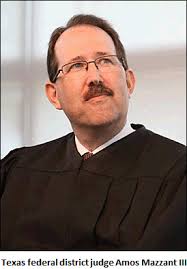Court Blocks Controversial O.T. Regs Imposed by Executive Order
There goes another one. Another signature Obama executive order put on hold as effortlessly as it was imposed, further underscoring the fragility of a presidential legacy that could be determined in great measure by the courts.
A federal court in Texas this week blocked implementation of a sweeping set of controversial white collar overtime provisions that were set to take effect within days. Critics called it a “ham-handed attempt to raise wages through regulation” and harmful to the middle class.
Meantime, one media outlet noted the irony that the federal judge who rebuffed the Administration got his black collar job as a result of being selected by Obama.
Texas District Court Judge Amos L. Mazzant granted a preliminary injunction on the department’s new overtime regulations, which would have forced employers to pay overtime to any white collar employee making less than $913 a week—double the previous threshold of $455. Mazzant’s temporary injunction will prevent the rules from taking effect on Dec. 1.
“Congress intended the EAP [executive, administrative, or professional] exemption to depend on an employee’s duties rather than an employee’s salary,” Mazzant said in the ruling.
As is often the case, the executive order has already created havoc among countless businesses big and small before officially even taking effect.
The overtime rules not only doubled the pay level, but also put into place a pay-scale escalator that would have automatically raised the threshold every three years. It was one of the Obama administration’s most wide-reaching regulations and was expected to affect 4 million workers.
The law met resistance from state and local governments, as well as numerous industry trade groups. More than 20 states sued the department, arguing that the new rules violated the 10th Amendment by infringing on a state government’s right to set pay levels and that the regulations did not abide by the law as it was written by legislators.
Judge Mazzant, who Obama appointed to Eastern District of Texas court in 2014, agreed with the plaintiffs that regulators stepped beyond the scope of the Fair Labor Standards Act.
“Nothing in the EAP exemption indicates that Congress intended the Department to define and delimit with respect to a minimum salary level,” he ruled.
Administration labor officials will likely file an appeal, but businesses and states applauded the last-minute Thanksgiving week reprieve as a boost to the economy and rebuke to federal regulators.
Nevada Attorney General Adam Laxalt applauded the ruling.
“Federal agencies cannot unilaterally reinterpret federal law to impose burdens on state governments and businesses, and today’s preliminary injunction reinforces the importance of rule of law and constitutional government,” Laxalt said in a release. “This latest example of federal overreach would have imposed millions of dollars of unfunded liabilities on the States, a loss of private sector jobs, huge financial and regulatory burdens on small businesses, and undoubtedly caused great difficulty across the country … Businesses and state and local governments across the country can breathe a sign of relief now that this rule has been halted.”
The National Retail Federation, which joined in the suit to block the new regulations, said the injunction would grant employers a reprieve from the department’s “reckless and aggressive overreach.”
“The Labor Department’s overtime changes are a reckless and aggressive overreach of executive power, and retailers are pleased with the judge’s decision,” NRF spokesman David French said in a release. “The rules are just plain bad public policy, and we are pleased that the judge is allowing time for the case to go forward before they can go into effect.”